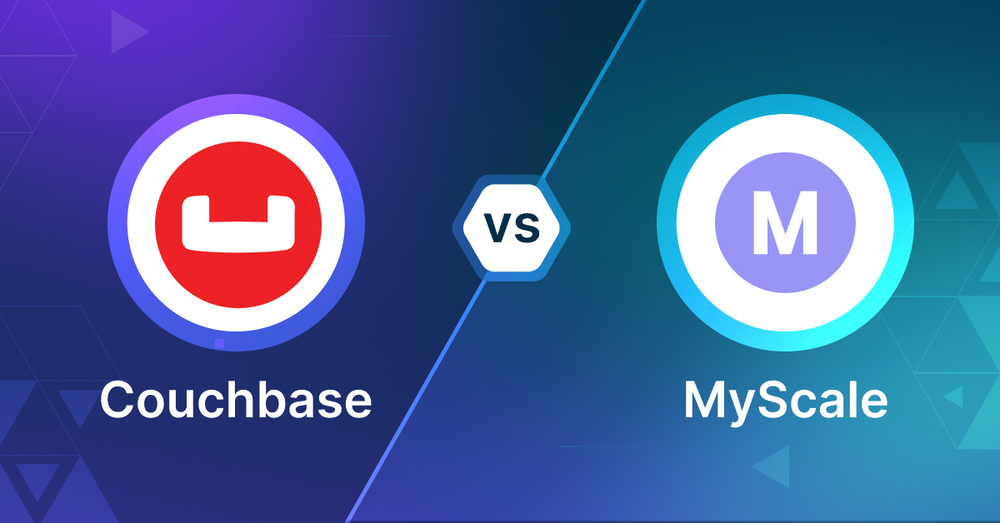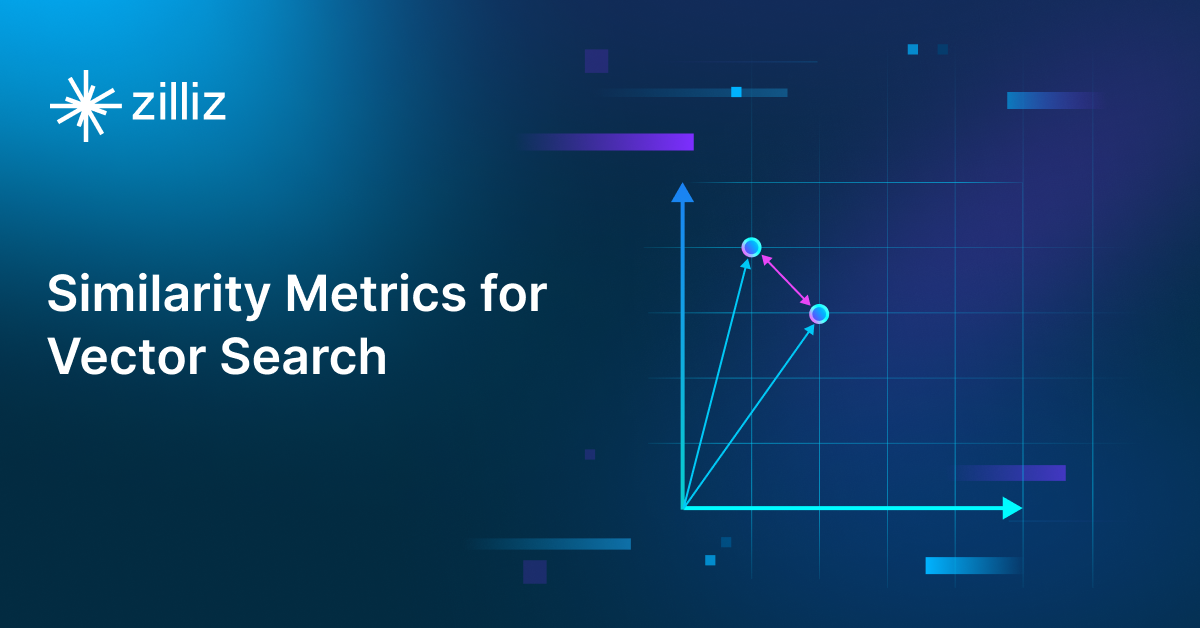Couchbase vs MyScale: Choosing the Right Vector Database for Your AI Apps

What is a Vector Database?
Before we compare Couchbase and MyScale, let's first explore the concept of vector databases.
A vector database is specifically designed to store and query high-dimensional vectors, which are numerical representations of unstructured data. These vectors encode complex information, such as the semantic meaning of text, the visual features of images, or product attributes. By enabling efficient similarity searches, vector databases play a pivotal role in AI applications, allowing for more advanced data analysis and retrieval.
Common use cases for vector databases include e-commerce product recommendations, content discovery platforms, anomaly detection in cybersecurity, medical image analysis, and natural language processing (NLP) tasks. They also play a crucial role in Retrieval Augmented Generation (RAG), a technique that enhances the performance of large language models (LLMs) by providing external knowledge to reduce issues like AI hallucinations.
There are many types of vector databases available in the market, including:
- Purpose-built vector databases such as Milvus, Zilliz Cloud (fully managed Milvus)
- Vector search libraries such as Faiss and Annoy.
- Lightweight vector databases such as Chroma and Milvus Lite.
- Traditional databases with vector search add-ons capable of performing small-scale vector searches.
Couchbase is distributed multi-model NoSQL document-oriented database with vector search capabilities as an add-on. MyScale is a column-oriented database built on ClickHouse with vector search capabilities as an add-on.
Couchbase: Overview and Core Technology
Couchbase is a distributed, open-source, NoSQL database that can be used to build applications for cloud, mobile, AI, and edge computing. It combines the strengths of relational databases with the versatility of JSON. Couchbase also provides the flexibility to implement vector search despite not having native support for vector indexes. Developers can store vector embeddings—numerical representations generated by machine learning models—within Couchbase documents as part of their JSON structure. These vectors can be used in similarity search use cases, such as recommendation systems or retrieval-augmented generation both based on semantic search, where finding data points close to each other in a high-dimensional space is important.
One approach to enabling vector search in Couchbase is by leveraging Full Text Search (FTS). While FTS is typically designed for text-based search, it can be adapted to handle vector searches by converting vector data into searchable fields. For instance, vectors can be tokenized into text-like data, allowing FTS to index and search based on those tokens. This can facilitate approximate vector search, providing a way to query documents with vectors that are close in similarity.
Alternatively, developers can store the raw vector embeddings in Couchbase and perform the vector similarity calculations at the application level. This involves retrieving documents and computing metrics such as cosine similarity or Euclidean distance between vectors to identify the closest matches. This method allows Couchbase to serve as a storage solution for vectors while the application handles the mathematical comparison logic.
For more advanced use cases, some developers integrate Couchbase with specialized libraries or algorithms (like FAISS or HNSW) that enable efficient vector search. These integrations allow Couchbase to manage the document store while the external libraries perform the actual vector comparisons. In this way, Couchbase can still be part of a solution that supports vector search.
By using these approaches, Couchbase can be adapted to handle vector search functionality, making it a flexible option for various AI and machine learning tasks that rely on similarity searches.
MyScale: Overview and Core Technology
MyScale is a cloud-based database solution built on the open-source ClickHouse database, designed specifically for AI and machine learning workloads. It can handle both structured and vector data, supporting real-time analytics and machine learning tasks. MyScale focuses on time-series data, vector search, and full-text search, making it suitable for applications requiring real-time processing and AI-driven insights. By leveraging ClickHouse's architecture, MyScale offers high performance and scalability for AI applications.
One of MyScale's key features is its native SQL support, which simplifies complex AI-driven queries by integrating vector search, full-text search, and traditional SQL queries in a unified system. This approach reduces the need for multiple tools and ensures scalability for AI applications. MyScale supports and manages the analytical processing of both structured and vectorized data on a single platform, utilizing advanced OLAP database architecture to execute operations on vectorized data efficiently. Developers can interact with MyScale using SQL, making it accessible to a wide range of programmers familiar with relational databases.
MyScale offers various vector index types and similarity metrics to cater to different use cases. It supports common distance metrics like Euclidean distance (L2), inner product (IP), and cosine similarity. The database provides several indexing algorithms, including MSTG (Multi-Scale Tree Graph), ScaNN, IVFFLAT, IVFPQ, IVFSQ, and HNSW, each with its own set of parameters for performance tuning. MyScale's proprietary MSTG vector engine leverages NVMe SSDs to enhance data density, allowing it to outperform specialized vector databases in both performance and cost-efficiency.
By integrating the functionalities of an SQL database, vector database, and full-text search engine into a single system, MyScale aims to reduce infrastructure and maintenance costs. This unification facilitates joint data queries and analytics, establishing a versatile data foundation for AI applications. MyScale also offers comprehensive observability for LLM systems through MyScale Telemetry, ensuring efficient monitoring and debugging. As data complexity grows, MyScale positions itself as a future-proof solution capable of handling newer data modalities and database sizes while maintaining computing performance and integration between different data types.
Key Differences between Couchbase and MyScale for Vector Search
Search Methodology
Couchbase doesn't have native vector search support. It offers workarounds like adapting Full Text Search (FTS) for vector searches or storing raw vector embeddings for application-level similarity calculations. Some developers integrate Couchbase with external libraries for vector search.
MyScale, on the other hand, provides native vector search capabilities. It supports various vector index types and similarity metrics, including Euclidean distance, inner product, and cosine similarity. MyScale offers indexing algorithms like MSTG, ScaNN, IVFFLAT, IVFPQ, IVFSQ, and HNSW, allowing for more efficient vector searches.
Data Handling
Couchbase is a NoSQL database that combines relational database strengths with JSON versatility. It can store vector embeddings within JSON documents, making it suitable for various data types.
MyScale handles both structured and vector data. It's built on ClickHouse, designed for time-series data, vector search, and full-text search. This makes MyScale more specialized for AI and machine learning workloads.
Scalability and Performance
Couchbase is known for its distributed architecture, which can provide good scalability. However, for vector search, performance may depend on the chosen implementation method and any external libraries used.
MyScale leverages ClickHouse's architecture for high performance and scalability. Its proprietary MSTG vector engine uses NVMe SSDs to enhance data density, potentially outperforming specialized vector databases in both performance and cost-efficiency.
Flexibility and Customization
Couchbase offers flexibility in implementing vector search, allowing developers to choose between adapting FTS, performing application-level calculations, or integrating with external libraries.
MyScale provides a unified system for SQL queries, vector search, and full-text search. This integration allows for complex AI-driven queries without needing multiple tools.
Integration and Ecosystem
Couchbase can be integrated with various tools and frameworks, especially those in the NoSQL ecosystem. For vector search, it may require integration with specialized libraries.
MyScale focuses on AI and machine learning workloads, offering integrations relevant to these areas. It also provides MyScale Telemetry for monitoring LLM systems.
Ease of Use
Couchbase may require more setup and custom development for vector search functionality, as it's not a native feature.
MyScale offers SQL support, making it accessible to developers familiar with relational databases. Its unified approach to handling different data types and search methods may simplify development.
Cost Considerations
Couchbase's cost will depend on your chosen implementation method and any additional tools or services required for vector search.
MyScale aims to reduce infrastructure and maintenance costs by unifying multiple functionalities in one system. However, specific pricing information isn't provided in the given text.
When to Choose Each Technology
When choosing between Couchbase and MyScale for vector search applications, consider your project's specific needs. Couchbase is a good fit for projects that require a flexible NoSQL database with the ability to add vector search functionality. It's suitable for applications where vector search isn't the primary focus, but where you need to store vector embeddings within JSON documents. Couchbase is also a strong choice if you want control over the vector search implementation, allowing integration with specialized libraries. Its distributed architecture can be beneficial for scalability in certain use cases, and its flexible JSON document model allows for adaptable schema design.
On the other hand, MyScale is the better option for AI and machine learning-focused applications. It's designed specifically for these workloads, supporting both structured and vector data. MyScale offers native vector search capabilities with various index types and similarity metrics, making it ideal for projects requiring built-in vector search functionality. It's particularly well-suited for applications that need unified SQL, vector search, and full-text search in a single system. MyScale also excels in scenarios involving time-series data alongside vector search. Its high-performance vector search capabilities, powered by the proprietary MSTG vector engine, can be advantageous for demanding applications. Additionally, MyScale's SQL support makes it accessible to developers with relational database experience, and its unified approach may help reduce infrastructure complexity and costs.
Conclusion
When deciding between Couchbase and MyScale for vector search, consider your specific needs and resources. Couchbase offers flexibility as a NoSQL database, allowing you to implement vector search through various methods like adapting Full Text Search or integrating external libraries. It's a good choice if you need a versatile database that can handle vector data alongside other types. MyScale, built on ClickHouse, provides native vector search capabilities and is designed specifically for AI and machine learning workloads. It offers a unified system for SQL queries, vector search, and full-text search, which may simplify development for AI-driven applications. Your choice should depend on factors such as your team's expertise, the importance of native vector search support, and whether you need a general-purpose database or a specialized solution for AI and analytics tasks.
While this article provides an overview of Couchbase and MyScale, it's key to evaluate these databases based on your specific use case. One tool that can assist in this process is VectorDBBench, an open-source benchmarking tool designed for comparing vector database performance. Ultimately, thorough benchmarking with specific datasets and query patterns will be essential in making an informed decision between these two powerful, yet distinct, approaches to vector search in distributed database systems.
Using Open-source VectorDBBench to Evaluate and Compare Vector Databases on Your Own
VectorDBBench is an open-source benchmarking tool designed for users who require high-performance data storage and retrieval systems, particularly vector databases. This tool allows users to test and compare the performance of different vector database systems such as Milvus and Zilliz Cloud (the managed Milvus) using their own datasets and determine the most suitable one for their use cases. Using VectorDBBench, users can make informed decisions based on the actual vector database performance rather than relying on marketing claims or anecdotal evidence.
VectorDBBench is written in Python and licensed under the MIT open-source license, meaning anyone can freely use, modify, and distribute it. The tool is actively maintained by a community of developers committed to improving its features and performance.
Download VectorDBBench from its GitHub repository to reproduce our benchmark results or obtain performance results on your own datasets.
Take a quick look at the performance of mainstream vector databases on the VectorDBBench Leaderboard.
Read the following blogs to learn more about vector database evaluation.
Further Resources about VectorDB, GenAI, and ML
- What is a Vector Database?
- Couchbase: Overview and Core Technology
- MyScale: Overview and Core Technology
- Key Differences between Couchbase and MyScale for Vector Search
- When to Choose Each Technology
- Conclusion
- Using Open-source VectorDBBench to Evaluate and Compare Vector Databases on Your Own
- Further Resources about VectorDB, GenAI, and ML
Content
Start Free, Scale Easily
Try the fully-managed vector database built for your GenAI applications.
Try Zilliz Cloud for FreeKeep Reading

Zilliz Cloud Introduces Advanced BYOC-I Solution for Ultimate Enterprise Data Sovereignty
Explore Zilliz Cloud BYOC-I, the solution that balances AI innovation with data control, enabling secure deployments in finance, healthcare, and education sectors.

Similarity Metrics for Vector Search
Exploring five similarity metrics for vector search: L2 or Euclidean distance, cosine distance, inner product, and hamming distance.

Multimodal Pipelines for AI Applications
Learn how to build scalable multimodal AI pipelines using Datavolo and Milvus. Discover best practices for handling unstructured data and implementing RAG systems.
The Definitive Guide to Choosing a Vector Database
Overwhelmed by all the options? Learn key features to look for & how to evaluate with your own data. Choose with confidence.